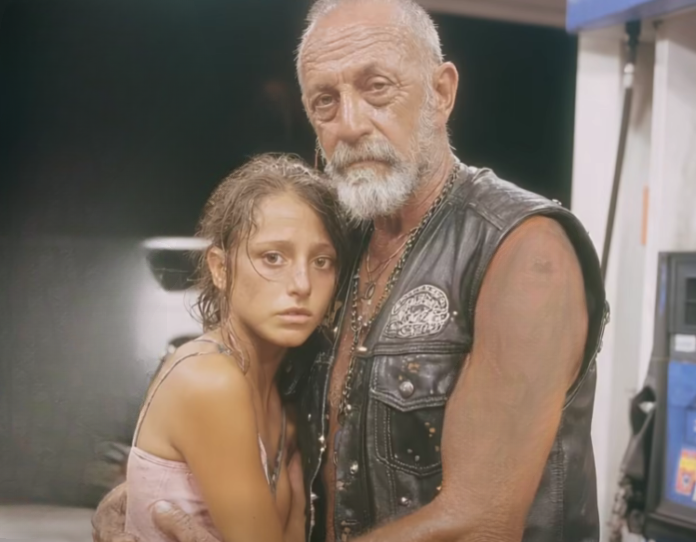Part 1: The Road That Leads Nowhere
At 3:07 AM, the world was asleep—or at least most of it. But on a quiet patch of concrete just off Interstate 70, the low rumble of a motorcycle engine sliced through the misty stillness. William “Hammer” Davidson, a seasoned rider of 69 years and a retired veteran, rolled into a quiet, dimly lit service station outside Kansas City.
His Harley coughed once before falling silent, the echoes swallowed by the thick, cool air. He took off his helmet with a sigh, his grizzled face damp from the ride and streaked with the fatigue of a man who had been in motion for far too long. He’d been riding for hours—how many, he couldn’t remember. Maybe twelve. Maybe fifteen. It didn’t matter. Time had lost its structure, blending into a gray blur of pavement, fog, and memories.
Just earlier that day, he had stood at the graveside of his younger brother. The last of his family. Gone.
Now, the road was all he had left. It had once offered him peace—an escape, a sense of direction, even a kind of therapy. But tonight, it felt aimless. It wasn’t taking him anywhere. It was just helping him flee from something he couldn’t bear to face: silence.
The gas station was old, worn, and nearly abandoned at this hour. A lone neon sign buzzed above the convenience store entrance, casting pale light over a row of dusty fuel pumps. Hammer parked near the entrance, dismounted, and stretched out his sore back and aching shoulders. The weight of loss clung to him like the dew in the air.
He stepped inside the store. The smell of stale coffee and refrigerated snacks greeted him. A young attendant behind the counter, barely conscious, offered a lazy glance and a nod.
Hammer grabbed a cup, filled it with bitter black coffee, and took a sip as he leaned against the wall near the window. No real destination. No plans. Just this—another anonymous stop on an endless highway.
But this night, unlike the countless others, was about to change everything.
Part 2: A Cry in the Shadows
As he stared through the glass at the darkened parking lot, Hammer heard a strange noise—faint, almost inaudible. A voice. Then another. And then something that stopped him cold: a soft cry. It was faint and brief, but unmistakable. A cry born not of pain, but of fear.
At first, he tried to rationalize it. Maybe a TV inside the clerk’s booth? A late-night phone call? But then came another sound—two men talking in raised, urgent voices. Not loud, but filled with edge. Frustration. Threat. And between their sharp tones came a trembling voice. Female. Frightened.
His years in the military, deployed in war zones around the globe, had taught him to read situations even in total darkness. Something was wrong.
Without finishing his coffee, he quietly stepped out of the store. The air hit him like a cold slap. He moved toward the back of the building where the voices were coming from. A single flickering floodlight cast eerie shadows across the rear wall.
He paused and listened—two men. One pacing, irritated. The other speaking low, firm, and fast. And then a girl’s voice, barely above a whisper, pleading.
He edged closer, careful to stay in the shadows. As he reached the corner of the building, he saw them: two men standing near a young woman, maybe in her early twenties. She looked terrified, arms crossed tightly over her chest. One man had a phone in his hand; the other stood too close, towering over her.
Then, in a single heartbeat, she saw him.
Her eyes locked with his. No scream. No words. Just a raw, silent message passed from one soul to another:
“Please, don’t leave me.”
And in that moment, William Davidson made a choice that would change both of their lives forever.
Part 3: A Stranger Steps In
Hammer didn’t hesitate. He stepped into view slowly but deliberately.
“Hey there,” he said evenly. “Everything alright out here?”
The two men turned quickly, surprised. One, the taller of the two, forced a laugh. “Yeah, man, all good. Just talkin’. She’s our friend.”
Hammer took another step forward, his eyes never leaving the girl.
“You sure?” he asked calmly, his voice carrying just enough weight to demand an answer.
“Yeah,” the shorter man muttered. “Just hangin’ out.”
Hammer didn’t argue. Instead, he reached into his jacket—slowly—and pulled out his wallet. He opened it and held it out.
“Well, if you’re stuck here this late, maybe I can buy you guys a tank of gas. Or a hot meal. I’ve been there. Not fun.”
The men exchanged confused glances. This wasn’t what they’d expected. And that’s when Hammer turned to the girl directly.
“You okay, miss?”
Her answer came quietly, but clearly: “Please… help me.”
Hammer’s stance changed instantly. The casual, wandering traveler was gone. What remained was a man who had faced death in jungles, deserts, and back alleys around the world.
He stepped forward, eyes locked on the two men.
“This is over,” he said in a tone that allowed no disagreement.
The taller man tensed, taking a half-step forward—but stopped when he saw Hammer’s expression. The look in his eyes wasn’t anger. It was something deeper. Something forged over decades of surviving battles—on and off the field.
After a tense pause, both men backed away. Muttering insults, they turned and walked toward their car. A moment later, the engine roared, tires screeched, and they vanished into the night.
Hammer turned to the girl, now trembling. Her knees looked ready to give out.
“You’re safe,” he said gently. “They’re gone.”
